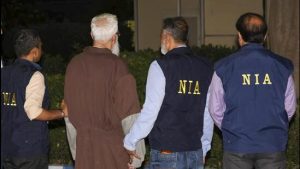New Delhi – In a significant development in India’s fight against terrorism, Tahawwur Rana, the notorious 26/11 Mumbai attacks conspirator, is currently undergoing intense interrogation by the National Investigation Agency (NIA) for the second consecutive day. The questioning aims to uncover the larger conspiracy behind the devastating series of coordinated strikes that shook Mumbai and the entire nation in November 2008. This marks a crucial phase in India’s ongoing efforts to bring all perpetrators of the heinous attack to justice, more than 16 years after the tragedy.
Extradition and Current Detention

Tahawwur Rana, 64, was successfully extradited from the United States after years of legal battles. He was handed over to a specialized team from the National Investigation Agency on Wednesday and subsequently transported to Delhi by Thursday evening. The extradition represents a significant diplomatic victory for Indian authorities who have been pursuing legal channels to bring key conspirators to Indian soil for prosecution.
Following his arrival in India, Tahawwur Rana has been placed in a highly secured cell within the NIA’s headquarters at the CGO complex in New Delhi. Security personnel have been deployed to guard him around the clock, emphasizing the high-profile nature of the detainee and the sensitive information he potentially possesses regarding the 26/11 Mumbai attacks.
A Delhi court has granted the NIA an 18-day custody period to interrogate Rana thoroughly. This extended custody period highlights the complexity of the case and the breadth of information investigators hope to extract from the accused conspirator of the 26/11 Mumbai attacks.
Detention Conditions
According to officials who spoke to Hindustan Times on condition of anonymity, Tahawwur Rana is being treated “as any other arrested person with no special treatment.” This standardized approach to his detention underscores the professional handling of the case despite its high-profile nature.
However, certain accommodations have been made for Rana’s religious practices. Upon his request, he has been provided with a copy of the Quran. Officials have observed that he is diligently offering Namaz five times daily in his cell at the agency’s headquarters, indicating his continued religious devotion even in detention. One officer described the 26/11 Mumbai attacks conspirator as a “religious man,” providing insight into his personal demeanor during captivity.
In addition to religious materials, Tahawwur Rana requested writing implements. Authorities have provided him with pen and paper, though he remains under constant surveillance to ensure he does not use these items to harm himself—a standard security protocol for high-value detainees. Officials noted that beyond these basic requests, Rana has not made any additional demands during his detention.
Legal Rights and Medical Care
As per court directives, Tahawwur Rana is being granted his legal rights while in custody. He is allowed to meet with a lawyer provided by the Delhi Legal Services Authority (DLSA) every alternate day, ensuring his access to legal counsel throughout the interrogation process. This adherence to legal protocols is crucial in maintaining the integrity of the investigation into the 26/11 Mumbai attacks.
Furthermore, Rana undergoes a medical examination every 48 hours to monitor his health condition. An officer confirmed that “all procedures are being followed, like for other arrested individuals,” emphasizing the standardized and proper treatment of the accused despite the severity of the charges he faces related to the 26/11 Mumbai attacks.
The Ongoing Investigation
Tahawwur Rana is currently being subjected to intensive questioning by a specialized team of NIA officials. The primary objective is to piece together his exact role in the 26/11 Mumbai attacks that left India traumatized over 16 years ago. The attacks, which targeted multiple locations across Mumbai including luxury hotels, a railway station, and a Jewish center, resulted in the deaths of 166 people and injuries to hundreds more.
According to sources, investigators are grilling Rana based on a comprehensive set of leads developed over years of investigation. One key focus is the dozens of phone calls documented between Rana and David Coleman Headley, also known as Daood Gilani. Headley, an American national of Pakistani descent, is currently serving a 35-year sentence in a US prison for his crucial role in planning the 26/11 Mumbai attacks. The communication patterns between these two individuals could reveal critical insights into the planning and coordination of the attacks.
Connections and Network
Investigators are particularly interested in the people Tahawwur Rana met in the lead-up to the 26/11 Mumbai attacks. Of special interest is a key contact in Dubai who, according to officials, may have been aware of the plan to target Mumbai. This Dubai connection could potentially reveal a previously unexplored dimension of the international conspiracy behind the attacks.
The 64-year-old Canadian businessman, originally from Pakistan, is also under intense scrutiny for his suspected links to Pakistan’s intelligence agency, the Inter-Services Intelligence (ISI), and the terrorist organization Lashkar-e-Taiba (LeT), which carried out the strikes. Establishing these connections would substantiate India’s long-held position that the 26/11 Mumbai attacks were not just the work of non-state actors but had state sponsorship from across the border.
Suspicious Pre-Attack Activities
One of the most intriguing aspects of the investigation centers around Tahawwur Rana’s travels across parts of north and south India just days before the attack. Officials hope that his answers regarding these suspicious movements might help uncover new details about the conspiracy behind the 26/11 Mumbai attacks. The timing and locations of these travels could potentially indicate reconnaissance activities or meetings with local contacts who may have facilitated various aspects of the attack.
The Rana-Headley Connection


The relationship between Tahawwur Rana and David Coleman Headley is central to understanding the planning and execution of the 26/11 Mumbai attacks. Headley, who has already been convicted in the United States, conducted extensive reconnaissance missions in Mumbai before the attacks, gathering crucial intelligence that was later used by the ten attackers who arrived by sea from Pakistan.
Rana allegedly provided cover for Headley’s activities by allowing him to open an office of his immigration business in Mumbai. This business front enabled Headley to travel repeatedly to India without raising suspicions, conduct detailed surveillance of potential targets, and relay this information back to the attack planners in Pakistan.
The communication between Rana and Headley, now being scrutinized by NIA investigators, may reveal the extent of Rana’s knowledge about the planned attacks and his active participation in facilitating them. It could also shed light on whether Rana was aware of the full scope of the planned 26/11 Mumbai attacks or if his involvement was limited to specific aspects of the conspiracy.
International Dimensions of the Case
The extradition of Tahawwur Rana from the United States to India represents a significant milestone in international cooperation against terrorism. The legal process leading to his extradition involved complex diplomatic negotiations and legal proceedings spanning several years.
Rana was first arrested in the United States in 2009 for his alleged involvement in the 26/11 Mumbai attacks. In 2011, a US court convicted him of providing material support to the terrorist organization Lashkar-e-Taiba and for his involvement in a plot to attack the Danish newspaper Jyllands-Posten. However, he was acquitted of charges directly related to the Mumbai attacks, a legal technicality that complicated but did not ultimately prevent his eventual extradition to India.
The successful extradition demonstrates the strengthening partnership between India and the United States in combating international terrorism. It also signals a recognition by American authorities of the gravity of the 26/11 Mumbai attacks and India’s legitimate interest in prosecuting all individuals involved in planning and supporting this act of terrorism on its soil.
The Broader Investigation into 26/11
The interrogation of Tahawwur Rana is part of India’s broader, ongoing investigation into the 26/11 Mumbai attacks. Despite the passage of more than a decade and a half, Indian authorities remain committed to uncovering every aspect of the conspiracy and bringing all perpetrators to justice.
The attack, which began on November 26, 2008, and continued until November 29, involved ten terrorists from Lashkar-e-Taiba who carried out coordinated shooting and bombing attacks across Mumbai. The primary targets included the Taj Mahal Palace Hotel, the Oberoi Trident Hotel, the Chhatrapati Shivaji Terminus railway station, Leopold Cafe, Nariman House (a Jewish community center), and the Cama Hospital.
Out of the ten attackers, nine were killed during the operation to neutralize them, while one—Ajmal Kasab—was captured alive. Kasab was subsequently tried, convicted, and executed in November 2012. His testimony provided valuable insights into the planning, training, and execution of the attack, but many questions remain about the broader conspiracy and the full network of individuals involved.
The Role of Pakistan
India has consistently maintained that the 26/11 Mumbai attacks were planned and directed from Pakistani soil, with support from elements within the Pakistani establishment. The interrogation of Tahawwur Rana could potentially yield additional evidence to support this claim.
The involvement of Pakistan-based terrorist organization Lashkar-e-Taiba in the attacks has been established through various pieces of evidence, including Kasab’s testimony, intercepted communications, and investigations by various international agencies. However, Pakistan’s prosecution of individuals alleged to have masterminded the attack, such as Hafiz Saeed and Zakiur Rehman Lakhvi, has been criticized by India and international observers as inadequate and lacking genuine commitment.
Information obtained from Tahawwur Rana regarding his contacts with Pakistani nationals, particularly those with connections to the ISI or Lashkar-e-Taiba, could potentially strengthen the case against Pakistan’s involvement in the 26/11 Mumbai attacks. This could have significant diplomatic and legal implications for India-Pakistan relations and for international efforts to combat state-sponsored terrorism.
Impact on Indo-US Relations
The extradition of Tahawwur Rana has positive implications for Indo-US relations, particularly in the realm of counterterrorism cooperation. It demonstrates a shared commitment to bringing perpetrators of terrorist acts to justice, regardless of where they may seek refuge.
This cooperation is especially significant given that American nationals were among the victims of the 26/11 Mumbai attacks. Six Americans were killed in the attacks, making it not just an Indian tragedy but also an American one. The willingness of the United States to extradite Rana to India reflects recognition of the global nature of the terrorist threat and the need for coordinated international responses.
The case also highlights the effectiveness of legal and diplomatic channels in addressing complex issues related to international terrorism. Despite the legal hurdles and the time taken, the eventual success of the extradition process underscores the value of persistence and adherence to international legal frameworks in combating terrorism.
Potential New Revelations
The interrogation of Tahawwur Rana could potentially lead to new revelations about the 26/11 Mumbai attacks that have remained unknown or unconfirmed until now. Given his close association with David Headley and his alleged connections to Lashkar-e-Taiba and the ISI, Rana may possess information about various aspects of the conspiracy that have not been fully explored.
These could include:
- The full extent of ISI involvement in planning and supporting the attacks
- The complete network of individuals who facilitated various aspects of the operation
- Other potential targets that may have been considered but ultimately not attacked
- The financing channels used to fund the operation
- Communication methods employed to coordinate between the planners and the attackers
- Whether there were local collaborators in Mumbai who provided assistance
- If the 26/11 Mumbai attacks were part of a larger strategic plan by Lashkar-e-Taiba or its state sponsors
Any new information obtained from Rana could potentially lead to further investigations, arrests, or diplomatic actions by India. It could also contribute to a more comprehensive understanding of how complex terrorist operations are planned and executed, which would be valuable for preventing similar attacks in the future.
Legal Proceedings and Potential Trial

Following the conclusion of the NIA’s interrogation period, Tahawwur Rana is likely to face formal charges in an Indian court for his alleged role in the 26/11 Mumbai attacks. The evidence gathered during his interrogation, combined with existing evidence collected over the years, will form the basis of the prosecution’s case.
The trial of Rana in India would be a high-profile one, given the significance of the 26/11 Mumbai attacks in India’s recent history and the public’s continued interest in seeing justice done for the victims and their families. It would also attract international attention due to the global implications of the case and the involvement of nationals from multiple countries among both the perpetrators and the victims.
The outcome of such a trial would depend on the strength of the evidence presented and the effectiveness of the legal proceedings. A conviction would represent another step forward in India’s quest for justice for the 26/11 Mumbai attacks, while also serving as a deterrent message to those who might contemplate similar acts of terrorism.
Final Word
The ongoing interrogation of Tahawwur Rana by the National Investigation Agency marks a significant development in India’s protracted investigation into the 26/11 Mumbai attacks. Despite the passage of more than 16 years since the attacks, the pursuit of justice continues with undiminished determination.
The information obtained from Tahawwur Rana could potentially fill crucial gaps in understanding the full scope of the conspiracy, the network of individuals involved, and the extent of state support from Pakistan. It could also lead to further legal and diplomatic actions aimed at holding all perpetrators accountable.
The successful extradition and interrogation of Tahawwur Rana demonstrates the effectiveness of international cooperation in combating terrorism and the importance of persistence in pursuing justice, even when the process spans many years and crosses international boundaries. Tahawwur Rana’s extradition sends a powerful message that there is no statute of limitations on terrorism and that perpetrators will be pursued relentlessly, regardless of where they may seek to hide.
As the NIA continues its meticulous questioning of Tahawwur Rana, the families of the victims of the 26/11 Mumbai attacks and the Indian public at large await with anticipation any new revelations that might emerge from this significant development in the case. The pursuit of truth and justice for one of India’s most traumatic terrorist attacks remains an ongoing national priority, with the interrogation of Rana representing an important milestone in this journey.
The 26/11 Mumbai attacks forever changed India’s approach to national security and counterterrorism. The interrogation of key conspirators like Tahawwur Rana not only serves the cause of justice but also contributes to the broader goal of preventing similar tragedies in the future through better understanding of how such attacks are planned and executed.
As the investigation of Tahawwur Rana progresses and new information comes to light, it reinforces the commitment to remember the victims of the 26/11 Mumbai attacks and to honor their memory by ensuring that all those responsible for their suffering are held accountable under the law. The case of Tahawwur Rana serves as a reminder that justice, though sometimes delayed, is not forgotten, and that the pursuit of those who plan and perpetrate acts of terrorism will continue unabated, regardless of the passage of time.
In the coming days and weeks, as more details emerge from the interrogation of Tahawwur Rana, the full extent of his involvement in the 26/11 Mumbai attacks may become clearer, potentially adding another important chapter to the ongoing investigation into one of the most devastating terrorist attacks in India’s history.
The determination shown by Indian authorities in pursuing this case demonstrates that the wounds inflicted by the 26/11 Mumbai attacks remain fresh in the national consciousness, and that the quest for justice continues to be a priority for the Indian government and its security agencies. The case of Tahawwur Rana serves as a testimony to this unwavering commitment to bring closure to a dark chapter in India’s fight against terrorism.

